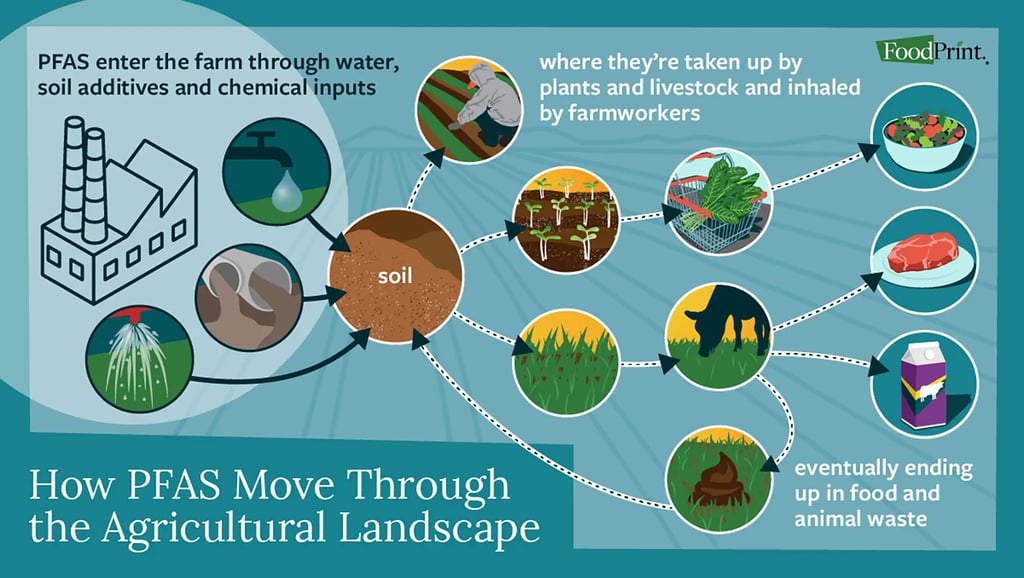The Hidden Dangers of PFAS in Agriculture: Unveiling the Risks of Biosolid Fertilizers
PFAS can contaminate soil, water, and food, especially through the use of biosolid fertilizers in agriculture. These chemicals pose significant health risks, including cancer and immune system damage. In this guide, we explain practical steps to protect your health and your land from PFAS exposure.
9/8/20243 min read


Understanding PFAS: What Are They and Where Do They Come From?
Per- and polyfluoroalkyl substances (PFAS) are human-made chemicals known for their resilience. Their strong carbon-fluorine bonds give PFAS their unique properties, such as resistance to heat, water, and oil, making them ideal for industrial uses. Since the 1940s, they’ve been incorporated into products like non-stick cookware, water-repellent fabrics, and firefighting foams.
While PFAS have benefited industries, they come with a heavy environmental price. These chemicals do not break down easily in nature and can accumulate in soil and water systems, leading to long-term contamination. PFAS are particularly problematic in agriculture, where biosolid fertilizers derived from treated sewage can introduce these toxic substances into farmland. Once applied, PFAS leach into the soil, water, and eventually our food supply, creating serious health risks.
PFAS in Agriculture: The Hidden Danger
Biosolids, often used to enrich farmland, have been utilized since the 1920s as a means of recycling nutrients from treated municipal wastewater. While beneficial in many ways, these fertilizers can contain harmful ingredients like heavy metals and PFAS, which persist in the environment and accumulate over time. As a result, crops grown in PFAS-contaminated soil can absorb these chemicals, introducing them into the food chain.
The health risks associated with PFAS exposure are alarming. These chemicals have been linked to various long-term health issues, including cancer, reproductive disorders, and immune system impairment. Over time, PFAS build up in the bodies of both humans and animals, further intensifying their negative effects.
EPA Lawsuit: A Call for Accountability
The U.S. Environmental Protection Agency (EPA) is currently facing a lawsuit filed by Public Employees for Environmental Responsibility (PEER), which argues that the EPA has failed to regulate PFAS in biosolid fertilizers. These chemicals are widely recognized as “forever chemicals” because they persist in the environment indefinitely, accumulating in soil, water, crops, and livestock. Despite growing evidence of harm, the EPA has not taken sufficient steps to regulate PFAS in agricultural practices, leaving farmers and consumers vulnerable.
This lawsuit is not just about holding the EPA accountable—it’s about protecting our food system and water supplies. Every time PFAS-laden biosolids are applied to farmland, contamination worsens, endangering both human health and the livelihoods of farmers.
What Can We Do?
Grow Your Own Food: Using compost made from ingredients sourced on your own land is the best way to avoid PFAS contamination. Here are a few practices to follow:
Avoid topsoil from PFAS-impacted farmland.
Say no to biosolid-based fertilizers.
Steer clear of manure from livestock exposed to contaminated feed or water.
Avoid using plastic containers to store crops or animal feed.
Avoid using plastic barriers and structures on your land, that may leach contaminations. Rainwater collection units often contain PFAS.
Avoid using Chicken wire and other galvanized steel products that contain toxins.
Filter water by reverse osmosis systems to remove contaminants or follow the mineral water boil method to help minimize the effects of PFAS.
Make Conscious Consumer Choices
Avoid products containing PFAS: From non-stick cookware to water-resistant fabrics and carpeting, many household items contain PFAS: paper cups/plates, tissues, cleaners, food packaging, such as popcorn bags, shampoo/conditioner, paints/waxes, makeup...
Advocate for Change: Inform others about the dangers of PFAS and push for stronger protections. Advocacy can lead to meaningful government action.
Conclusion: A Growing Threat
PFAS contamination in agriculture is a growing threat to our health and our environment. The ongoing lawsuit against the EPA highlights the urgent need for action, but we don’t have to wait for the government to protect ourselves. By making informed decisions about what we grow, buy, and use, we can reduce our exposure to these “forever chemicals” and take steps toward a safer, healthier future.
The time to act is now. Together, we can raise awareness, demand change, and fight for a food system that prioritizes both environmental and human health—free from the shadow of PFAS.

